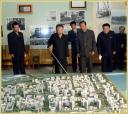By Benjamin Katzeff Silberstein
A few days ago, Daily NK reported that apartment prices in Pyongyang have fallen by significant proportions over the last few months. They first wrote about it in Korean last week:
평양 소식통은 26일 데일리NK와의 통화에서 “평양에서 아파트 가격이 많이 눅어(떨어)졌는데, 이상하게도 아파트 건설은 줄어들지 않고 오히려 늘고 있다”면서 “중심 구역뿐만이 아니라 낙랑구역이나 서성구역 등 외곽 지역에서도 많이 올라가고 있는데, 내가 본 것만 7개다”고 말했다.
소식통은 이어 “돈주(신흥부유층)가 돈 내고 건설해서 팔아먹는데 창전거리나 려명거리에 있는 아파트처럼 멋지게 올라가고 있다”면서 “아파트 건설은 보통 20~30명의 군인이 동원돼 건설 중이며 30층짜리 아파트도 있고 종류가 다양하다”고 덧붙였다.
이달 초 본지는 올해 6월까지 20∼30만 달러(이하 면적 230㎡)를 유지해왔던 평양의 중심지역인 중구역 및 대동강 주변 아파트 가격이 8월에 5만 달러 이상 하락한 것으로 파악됐다고 보도한 바 있다.
이처럼 아파트 가격의 폭락에도 불구하고 아파트를 건설하는 데는 신규 아파트의 경우 고가로 거래되기 때문에 투자가치가 있다고 판단하는 것으로 분석된다.
본지가 지난 4월 입수한 탑식 아파트 경제 타산서(북한식 공사 손익계산서)를 조사한 결과 40세대가 사용할 수 있는 아파트(한국의 빌라, 총 12층 기준)를 건설할 때 약 23만 달러(약 2억 4000만 원)의 수익을 내는 것으로 나타났다. (▶관련 기사 바로 가기 : 경제타산서 입수…”40세대 아파트 건설·분양시 23만달러 수익”)
또한 지난 10년간 아파트 가격이 지속 상승, 돈주들에게 많은 부를 안겨준 점도 한몫 하는 것으로 보인다. 아울러 한반도 평화 분위기 속에 향후 대북제재가 해제되면 다시 아파트 가격이 상승할 것이라는 기대 심리도 작용한 것으로 관측된다.
And in English here, yesterday:
Despite the fall in North Korean real estate prices, apartment construction has not slowed down, report sources in the country.
“The prices of apartments in Pyongyang have fallen a lot, but strangely the construction of apartments has continued and even increased,” said a Pyongyang-based source on October 26. “There’s apartment construction going on in central Pyongyang and in the city’s suburbs, like the Rakrang and Sosong districts. I’ve seen seven apartment construction sites myself.”
A separate source in Pyongyang added, “The donju (nouveau riche) are financially supporting these apartment construction projects and then selling the apartments to buyers. There are really nice ones being constructed, similar to those in Changchon Street and Ryomyong Street. Twenty to thirty soldiers are usually mobilized to build them. There are 30-story apartments and others of varying heights.”
Daily NK reported earlier this month that the price of apartments in central Pyongyang, including in Jung district and those near the Taedong River, had fallen from a high of 200-300,000 dollars in June this year to around 50,000 dollars in August.
However, local investors still appear keen to build the apartments because they can be sold for significant profits.
According to an analysis of a North Korean construction profit-and-loss statement Daily NK obtained in April, apartments that can house 40 families (around 12-stories tall; similar to South Korean “villas”) can make a profit of around US $230,000 US dollars (around 240 million South Korean won) [from rent].
The continued rise in apartment prices over the past 10 years has helped the donju accumulate a lot of wealth, which appears to be one factor in the continued construction of apartments. And as tensions on the Korean Peninsula have dissipated, there may also be the expectation among investors in the country that international sanctions will be lifted, which would again lead to a rise in apartment prices.
Full article/source:
Apartment construction remains steady despite fall in real estate prices
Moon Dong Hui
Daily NK
2018-10-30
The dynamics at play here tells us something very interesting and important about the current state of North Korea’s economic system. For all the developments and changes over the past couple of decades, and particularly under Kim Jong-un, basic functions of a regular market economy, such as formal channels for investments, through which people can see their savings grow in value (or shrink, in bad times). In North Korea, however, private investments technically remain illegal. Housing is one area where they’ve become standard practice and more or less regularized, despite the judicial murkiness of it all.
So when housing prices decline, what are people going to do, if they don’t want to keep their money laying around passively? Keep putting them into housing. After all, a lower profit is better than no profit. This dynamic can’t last forever, but as of now, the fact that investment opportunities are still relatively few may be keeping a bubble alive that already burst.

